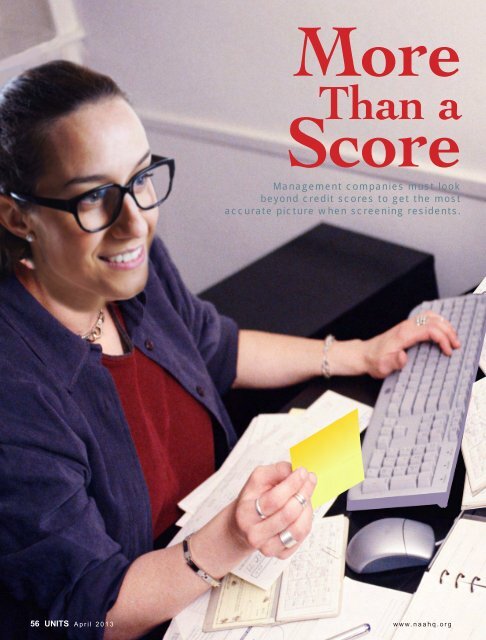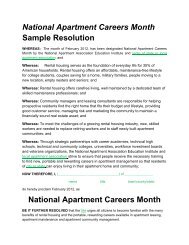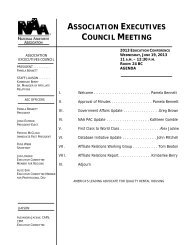full article - National Apartment Association
full article - National Apartment Association
full article - National Apartment Association
- No tags were found...
You also want an ePaper? Increase the reach of your titles
YUMPU automatically turns print PDFs into web optimized ePapers that Google loves.
MoreThan aScoreManagement companies must lookbeyond credit scores to get the mostaccurate picture when screening residents.56 UNITS April 2013 www.naahq.org
BY LAUREN BOSTONThere’s more to a credit score than meets the eye. Five percent of consumers had errors onone or more of their three major credit reports, and 25 percent identified errors in theircredit file that might affect their credit score, according to a February report by theFederal Trade Commission that was based on an eight-year study of the credit reportingindustry.Based on this study, apartment owners may want to think twice about making a leasing decision solelyon a prospective resident’s credit information. Doing so could allow as many as one-quarter of perfectlyqualified applicants walk out the door while apartments remain vacant.“Any statistical report is subject to serious flaws when data is inaccurate, incomplete or missing—whichcan often be the case with credit scores,” says Kevin Wolfgang, President and CEO of New Castle, Del.-basedEvergreen <strong>Apartment</strong> Group. “We have found that factors such as previous rental history, length of employmentand disposable income can be more important than a credit score.”As such, management companies are working with screening companies to build a risk model thatincludes credit scores, but weights them appropriately.“Most screening vendors will provide an adaptable risk model with endless options that account for avariety of factors that impact the likelihood of a successful resident,” Wolfgang says. “However, propertymanagement companies must use their experience, statistics and general expertise to determine whichoptions are activated, the thresholds for the options and how the options are weighted.”Customer First, Credit SecondAmanda Rote, Marketing Director for Columbus, Ohio-based Plaza Properties, says her company nolonger uses a standard credit score. Instead, it combines the credit score and other factors set forth by itsscreening provider to determine the risk associated with renting to a particular applicant.Rote says Plaza Properties also considers an applicant’s rent-to-income ratio, rental debt, collections,bankruptcies, evictions and criminal history.Additionally, other industry professionals are demanding a higher level of customer service from theirscreening companies when it comes to interacting with their applicants.While the federal Fair Credit Reporting Act (FCRA) requires screening companies to maintain proceduresto allow consumers to dispute inaccuracies in their reports, the law allows up to 30 days for an investigationof a dispute. If a screening company takes the <strong>full</strong> 30 days to respond to a consumer, disputes are thentransferred over to the credit bureaus. The process can often frustrate and confuse a prospective resident,who has lost out on renting the apartment they wanted because of the delay.These factors can not only damage a management company’s reputation, but also generate needless lawsuits.Management companies can avoid these headaches by hiring a resident screening company that hasinvested in responsive customer service. Screening companies with call centers devoted to renter relationsare steadily growing, resolving disputes directly with applicants.A prospective resident can provide a screening company with documents proving that a bill was paid orthat a trade line does not belong to them, for example, and adjustments to the report can be made rightaway without having to wait on the credit bureaus to make the same determination.If a screening company can save a lease by taking a few simple steps to correct bad credit data, theyhave protected a company’s reputation, filled a vacant apartment and prevented a potential fair housingcomplaint.Raising a Red FlagThe Fair and Accurate Credit Transaction Act—known as the FACT Act, or FACTA—provides potentialfraud warnings, placed on the credit bureau reports by consumers, the credit bureau or law enforcement.These warnings—Red Flag Fraud Alerts—are categorized as either Initial Fraud Alerts (IFAs) orExtended Fraud Alerts (EFAs). IFAs remain on a credit file for 90 days and are placed by a consumer or creditreporting agency if there is reason to believe that the consumer is, or is about to be, a victim of identity theft.www.naahq.org April 2013 UNITS 57
“Once an alert is detected, it automatically triggers a well-defined processthat a screening company can verify and document to assure compliance.”—Miria Rabideau, Regional Vice President for Cleveland-based REIT Associated EstatesIf there is a valid police report or similar identity theft report,the notification becomes an EFA and remains on record for upto seven years.For apartment management companies and their screeningproviders, ignoring these alerts is not only a risky business practice,but can lead to personal liability for anyone that bypassesthe warning and approves an unverified alert.Cindi Scoggins, Executive VP for Westdale Asset Management,says her screening provider has a FACTA verification process inplace, which removes the “guesswork and liability” from thescreening process.“The FACTA process can be pretty simple if your screeningprovider has the right tools,” adds Miria Rabideau, RegionalVice President for Cleveland-based REIT Associated Estates.“Once an alert is detected, it automatically triggers a welldefinedprocess that a screening company can verify and documentto assure compliance.”If a consumer’s phone number is provided on an alert, theconsumer must be called only at that number to confirm his orher identity before their credit and rental applications areapproved. If a phone number is not provided, the applicant mustbe denied until the alert is removed.Failure to follow these guidelines is a liability for the leasingteam or regional manager, who could be responsible for actualand statutory damages, as well as Federal and State fines foreach violation. Additionally, the management company couldbe subject to a class-action liability if a large number of employeesare affected.Due DiligenceOnce a prospective resident is screened and accepted, the workis far from over.Many property management companies say it is important topartner with a screening provider that has the tools to share anynew or updated criminal information on a resident from thetime of the original screening, providing valuable informationabout criminal behaviors associated with residents after theymove into the community.In such cases, customers will need to satisfy additionalFCRA compliance requirements because consumer reportingwww.naahq.org April 2013 UNITS 59
NAA Creates Ex-Offender Model LegislationRecently, NAA has seen a surge in policymakers promoting legislative proposals that restrict a property owner’sability to consider arrest and conviction records in resident and employee screening. As these issues directly affectthe multifamily industry, policy proposals that give ex-offenders (individuals with criminal histories) protections underboth fair housing and employment laws have become a major concern.As the 2012 chairwoman of the NAA Legislative Committee, Cindy Clare, President, Kettler Management, formed theEx-Offender Protections Working Group to review ex-offender protections proposals. The group was charged with creatinga model set of general industry policy positions and continues to work as a platform to discuss future strategies that theindustry may employ when faced with criminal background protection proposals locally.The working group developed several documents, including model legislation. The intent in drafting and circulatingmodel legislation is not to urge members to pursue the measure in their respective jurisdictions but rather to recognizethe likelihood that similar legislation may surface. Should similar legislation be proposed, the memo may serve as a toolto help advance the apartment industry’s interests in deliberations with lawmakers and other stakeholders on this issue.The model legislation contains two components that address apartment industry concerns:(1) exceptions giving property owners and managers the ability to screen potential residents andemployees who pose the greatest risk; and (2) a waiver of liability that shields owners and managersfrom liability should a resident or employee who was approved under the proposal commita crime on the community’s property.The ex-offender model legislation will be combined with the NAA Government Affairs’ IssueAlmanac about criminal background checks that covers legislative and regulatory proposalsprohibiting the use of arrest and criminal records in screening procedures for prospectiveresidents and employees as well as disparate impact litigation. (NAA develops Issues Almanacsfor key state and local issues affecting the industry.)These documents will be packaged as a “toolkit” that members and affiliate staff may utilizeshould this issue arise in their state or locality. The toolkit also includes examples of enactedand proposed legislation that affect resident and employee screening and an analysis of theresults of a survey NAA staff conducted in October 2012 regarding member screening policies.NAA staff surveyed a mix of screening companies and property owners and managers fromindependent owner-operators to NAA’s largest management company members. The surveyyielded invaluable information that was used to craft model legislation on this issue. Forexample, the survey revealed that respondents apply a variety of standards in screening for criminal history. Mostrespondents’ search parameters include a prospective resident or employee’s criminal history from the past five to2013 NAA State and LocalIssues Chair Michael Clarkreports to the LegislativeCommittee at the NAACapitol Conferenceregarding the Ex-OffenderProtections Working Group.10 years, while others search a prospect’s <strong>full</strong> criminal history. Also, 84 percent of respondents review and consider thetype and degree of the crime committed by the individual under consideration for tenancy or employment as opposedto a policy that denies all residents with criminal histories.This toolkit represents the conclusion of this working group’s efforts, led in 2012 by the NAA State and Local Issues ChairRobert Tinning, Executive Vice President, Churchill Residential, and Michael Clark, Principal, Alpha-Barnes Real EstateServices in 2013. After a final review, this toolkit will be available by June. Email Nicole@naahq.org for information.—NAA’s Nicole Upano, Manager of State and Local Government Affairsinformation is being accessed after the initial screening.“We monitor the sex offender registries on a regular basisbecause the data is easily found and these types of offenders haveto register their place of residence,” says Bob Kohlman, VicePresident of Operations and Construction for BRG <strong>Apartment</strong>s.“We don’t currently use a service to monitor the residents’ criminalrecords once they move in, but as the world around uschanges, it may become a necessary part of how multifamilycompanies conduct business.”Although speed and convenience are desirable when pre-screeningapplicants, it is imperative that screening companies providethe data in a legal manner. Not doing so may result in liabilities60 UNITS April 2013to the end user regarding decisions made on their applicants.The goal of the resident screening industry is to support thosein multifamily housing while respecting consumers’ rights. Adata provider who focuses too much on one or the other mayultimately put themselves and their users at risk.Lauren Boston is NAA's Staff Writer.Thank you to NAA <strong>National</strong> Suppliers Council (NSC) members Yardi,ResidentCheck, AmRent, On-Site and Contemporary InformationCorp. (CIC) for contributing to this <strong>article</strong>. For a list of NSC memberswho provide resident and employee screening, see page 77.www.naahq.org








